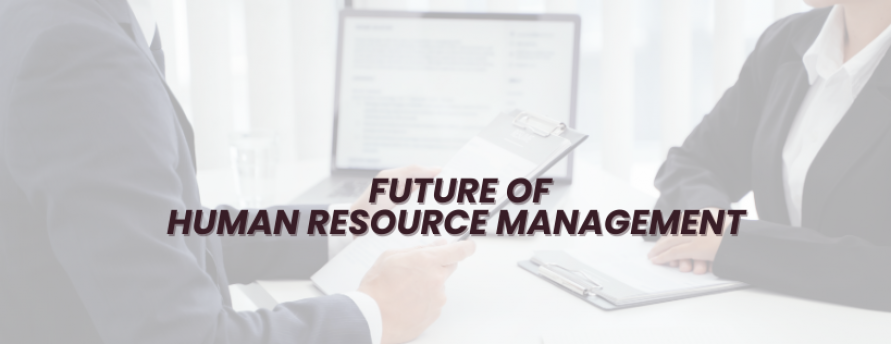
07
Nov 2024
Future of HRM 2030
Dr. Harshada Mulay |
Management
Human Resource Management (HRM) is rapidly transforming, and by 2030, the field will experience significant shifts
fueled by technology, workforce trends, and organizational goals. MET Institute of PGDM
offers PGDM specialized in HR, equipping
future HR leaders with the skills needed to excel in this evolving landscape. Here's a look at how the HRM of tomorrow
is shaping up:
1. AI and Automation in Talent Management
- Personalized Employee Experiences: AI-driven systems will allow HR teams to tailor experiences to
individual employees, from onboarding to career development. AI will help identify and nurture talent, suggesting
personalized training based on skill gaps.
- Efficient Recruitment Processes: With the rise of automation, tasks such as resume screening,
initial candidate assessments, and interview scheduling will be faster and more efficient, freeing HR teams for
strategic activities.
- Predictive Analytics for Retention: AI and data analytics will enable HR teams to predict
employee attrition and proactively address issues. Predictive analytics will provide insights into job satisfaction,
helping to create personalized retention strategies.
2. Hybrid Work Environments
- Flexible Work Structures: By 2030, the hybrid model will be widely adopted, allowing employees
to
work from home, office, or any location. This approach will require HR to develop policies and manage resources to
support flexibility and maintain productivity.
- Virtual Collaboration and Culture Building: Tools that facilitate virtual interactions,
training,
and team-building activities will become essential. HR will have to focus on maintaining a strong company culture
despite physical distances.
- Redefining Work-Life Balance: HRM will need to monitor employee well-being closely, ensuring
that
flexible work options don’t lead to burnout. Strategies to support mental health and work-life balance will
be
critical.
3. Focus on Employee Wellness and Mental Health
- Holistic Wellness Programs: In 2030, wellness programs will be more comprehensive, covering
physical, mental, and financial health. Companies will offer resources such as mindfulness programs, therapy
support, and financial planning.
- Mental Health as a Core Focus: Awareness around mental health will lead companies to provide
mental health days, in-house therapists, and resilience training.
- Workplace Inclusivity and Psychological Safety: HR will prioritize inclusivity by creating safe
spaces for open discussions and supporting diverse needs within the workforce. This approach not only boosts
employee satisfaction but also strengthens team cohesion.
4. Skills Development and Lifelong Learning
- Continuous Learning Platforms: By 2030, HR will be investing in platforms that allow employees
to
continuously upskill in line with evolving job requirements. These platforms will enable employees to explore new
areas and stay relevant in a rapidly changing job market.
- Soft Skills as Core Competencies: The demand for skills such as emotional intelligence,
communication, and creativity will grow, especially with AI handling more technical tasks. HR will provide
resources
for employees to develop these essential skills.
- Adaptable Career Pathways: Employees will have opportunities to explore multiple career paths
within the organization, supported by HR programs designed to enable lateral and upward mobility based on skills
and
interests.
5. Data-Driven Decision-Making
- Enhanced Decision-Making with HR Analytics: Data will empower HR teams to make strategic
decisions, from recruitment to employee engagement. HR professionals will leverage real-time insights to optimize
workflows and improve the employee experience.
- Privacy and Ethical Considerations: With increased data collection, HR must navigate ethical
concerns surrounding employee data privacy, ensuring transparency and safeguarding personal information.
- Performance Metrics Beyond KPIs: Future metrics will focus not only on productivity but also on
engagement, innovation, and collaboration. HR teams will develop holistic evaluation models that reflect the
diverse
contributions of employees.
6. Emphasis on Diversity, Equity, and Inclusion (DEI)
- DEI-Driven Strategies: Organizations will prioritize hiring practices that promote diversity
and
ensure equal opportunities. DEI will be embedded into all HR processes, from recruitment to career development.
- Global Talent Pools: The hybrid work model allows access to a global talent pool, making
cultural
competence a crucial HR focus. HR will need to foster inclusivity across borders, accommodating cultural nuances
and
time zones.
- Bias Mitigation in AI Systems: As AI tools become common in HRM, it will be crucial to address
biases within these systems. HR teams will work with technologists to ensure fairness in AI-driven hiring,
evaluations, and promotions.
Conclusion
The future of HRM is about blending technology with a human-centric approach. MET Institute of PGDM’s
PGDM in HRM
prepares
students for a field where AI and data enhance efficiency, but the essence of HR remains centered on people. Future
HR
professionals will not only be facilitators but also strategic drivers of organizational success. This evolution
ensures that employees are supported, equipped, and motivated to thrive, making MET a leading choice for those
aspiring to excel in HRM.
 Leave a reply
Leave a reply
 Reviews (0)
Reviews (0)
 Reviews (0)
Reviews (0)


 Leave a reply
Leave a reply
 Reviews (0)
Reviews (0)
 Reviews (0)
Reviews (0)